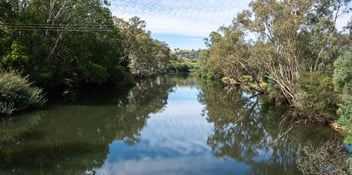Murray-Darling basin management changes
The Federal Government is set to establish a new statutory authority to improve water compliance in the Murray-Darling basin and has announced an array of investments aimed at putting “communities back at the centre of water reform” in the basin.
The announcement came from Minister for Resources, Water and Northern Australia Keith Pitt last week, and revealed plans to respond to findings from the Independent Assessment of social and economic conditions in the Murray-Darling Basin, delivered by Basin Socio-Economic Assessment Panel Chair Robbie Sefton.
The announcement also comes in response to the First review of the Water for the Environment Special Account, which found that water recovery targets will not be met by the 2024 deadline under current arrangements.
Pitt said that the government will no longer buy back any more water from farmers to meet the Basin Plan recovery targets, following an overwhelming response from the irrigation community struggling to stay afloat during drought.
“The assessment was a huge undertaking, and its findings and recommendations have been critical in my consideration for the path forward,” Pitt said.
“Now at the heart of what our government is doing, and the response to the reports, is a commitment to put communities back at the centre of water reform in the Murray-Darling basin.
“I'm launching an action plan to refresh our commitment to the future of communities in the Murray-Darling basin. My fight is squarely on increasing the efficiency of water use in the system, including for the environment.”
Ban on buybacks
Pitt said that while water buybacks have served a purpose, the impact this water reform tool has on basin communities is no longer sustainable, socially or economically.
“To successfully recover from COVID and drought and bushfires, we must grow our economy in this incredible food bowl we call the Murray-Darling basin,” he said.
“While some founders have done well with water buybacks, and river health gains have accrued to all Australia, for some irrigation communities, it has been a net negative."
Pitt said that taking water out towns built on irrigation resulted in significant consequences for those communities.
"And this message is very clearly spelled out in the Sefton report. The Government has heard the community's message loud and clear," he said.
“Therefore, the cornerstone of the measures outlined in the action plan I launch today is to put an end to water buybacks.”
Pitt said removing water buybacks will require a lot more effort in terms of increasing water-use efficiency and ensuring these projects work.
“This will mean shifting the focus of the water efficiency program to all farm projects, not just farmers and water licenses. It means ensuring the projects set to replace 605 gigalitres worth of buyback succeed,” he said.
“These projects must be flexible, and they must have community support. Secondly, I'm announcing funding for new projects to put money back into communities that have been adversely affected by water reform.”
Investing in basin communities
Of the many investment announcements made, the most significant was a $34 million economic fund for regional community projects aimed at helping regions negatively impacted by water reform recover.
“[There will be] $34 million to extend the Murray-Darling basin economic development fund. This important grant provides support for those communities hit by water recovery to create a better and more diverse economic future,” Pitt said.
And to replace environmental recovery aims arising from removing water buybacks, Pitt announced $20 million for community-driven projects that improve the health of rivers and wetlands, while supporting economic development and jobs.
“I want to stress river health is not just about river flows. It's about all the things that contribute to healthy rivers, like erosion control, cold water pollution, controlling carp and other pests,” he said.
“It's about protecting wetlands, the birds and fish; those complementary measures that move up away from arguing about the numbers and toward the focus on outcomes.”
Other investment announcements include a $3 million fund for Indigenous water rangers, which is expected to create 20 jobs for Indigenous people across the basin.
Pitt also announced $7.5 million for monitoring and adaptive management, $25 million for improved metering, $30 million for compliance and enforcement, and $8 million to establish the new Inspector-General office.
Separating compliance and management
The new statutory authority announced by Pitt will combine existing staff from the Murray-Darling Basin Authority but will also include the Interim Inspector-General of Murray Darling Basin office, effectively separating basin compliance from basin management.
“Water reform and the challenges around it have driven a growing community distrust of all levels of government,” Pitt said.
“The trust deficit needs repair, and no one has better placed them in that gap. It's a gap that all governments share; all of us have a role in water and we all need to step up and repair relationships with biking communities. The fact will always remain that it is a shared river system.”
Pitt said all governments must do more when it comes to improving accountability and transparency, but, to improve community trust, the government would aim to establish a “a single point of truth” for accurate and updated water information.
“Having a one stop shop for information on water storages, instream fly rights where environmental water is being used, water allocators, ownership, trade information,” he said.
“Another critical component to restoring people's faith in governments is ensuring that compliance approaches are transparent, independent, and of the highest standards. So today, I announce our intention to work with basin water ministers, to establish an inspector general of water compliance.
“I'll merge the MDBA compliance functions with the existing interim inspector general of Murray-Darling basin water resources to consolidate the Commonwealth regulatory responsibilities when it comes to water in the basin.
“In effect, this will split the MDBA, while separating its compliance office into a separate institution.”

